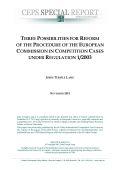Glendinning, S. (2014) “Europe’s goal should not be a United States of Europe, but a better united Europe of states“, LSE EUROPP, 20 Νοεμβρίου. Is a European ‘superstate’ desirable and, if so, could it ever be created? Simon Glendinning writes on philosophical approaches to this question, drawing on the work of philosophers such as Hegel, Kant, Marx and Derrida. Taking inspiration from Kant, he argues that rather than aiming …Read More
Does EU regulation hinder or stimulate innovation?
Pelkmans, J. & Renda, A. (2014) “Does EU regulation hinder or stimulate innovation?“, Regulatory Policy, CEPS Special Reports, 19 Νοεμβρίου. One frequently hears the question posed in the title to this report, but there is little systematic analytical literature on the issue. Fragmented evidence or anecdotes dominate debates among EU regulatory decision-makers and in European business, insofar as there is a genuine debate at all. This CEPS Special Report …Read More
Is there (sustainable) growth in Greece?
Bastian, J. (2014) “Is there (sustainable) growth in Greece?“, MacroPolis: Greece in Perspective, 19 Νοεμβρίου. Greece finally exited its six-year long recession in the third quarter of 2014. The Hellenic Statistical Authority ELSTAT said that the economy grew by 0.7 percent in the third quarter (compared to the same quarter in 2013). The positive third quarter reading is the first after 24 consecutive quarters of negative GDP performance dating …Read More
Growth, inequality, and social welfare: Cross-country evidence
Dollar, D., Kleineberg, T. & Kraay, A. (2014) “Growth, inequality, and social welfare: Cross-country evidence“, VoxEU Organisation, 19 Νοεμβρίου. Concerns about inequality are at the forefront of many policy debates. While inequality has increased in many countries over the past few decades, in others it has decreased. This column uses data from 117 countries over the past four decades to investigate the importance of such changes in inequality, as …Read More
Greece – return to growth demonstrates the role of substantial fiscal deficits
Mitchell, B. (2014) “Greece – return to growth demonstrates the role of substantial fiscal deficits“, Bill Mitchell Blog: Modern Macroeconomic Theory – Macroeconomic Reality, 19 Νοεμβρίου. We had news this week that the annual rate of real GDP growth in Greece is finally positive after two quarters of positive growth. The austerity merchants are out in force congratulating themselves on a victory. Some victory. What the official data doesn’t …Read More
Erosion Or Exhaustion Of Democracy? The Challenge For Social Europe
Blühdorn, I. (2014) “Erosion Or Exhaustion Of Democracy? The Challenge For Social Europe“, Social Europe Journal, 18 Νοεμβρίου. Social Europe is caught between a rock and a hard place. It is supposed to restore confidence in democracy – which since the bailout of the failing banks and the ensuing politics of austerity can hardly be regarded as a plausible promise anymore and which, anyway, at EU-level is known primarily …Read More
Rethinking the Attractiveness of EU Labour Immigration Policies: Comparative perspectives on the EU, the US, Canada and beyond
Carrera, S., Guild, E. & Eisele, K. (2014) “Rethinking the Attractiveness of EU Labour Immigration Policies: Comparative perspectives on the EU, the US, Canada and beyond“, Justice and Home Affairs, CEPS Paperbacks, 13 Νοεμβρίου. Is Europe’s immigration policy attractive? One of the priorities driving current EU debates on labour immigration policies is the perceived need to boost Europe’s attractiveness vis-á-vis ‘talented’ and ‘highly skilled’ immigrants. The EU sees itself …Read More
The 2014 EU-wide bank stress test lacks credibility
Goldstein, M. (2014) “The 2014 EU-wide bank stress test lacks credibility“, VoxEU Organisation, 18 Νοεμβρίου. Results from last month’s EU-wide stress test are reassuring, especially for countries at Europe’s core. This column warns against a rosy interpretation. The test relies on risk-weighted measures of bank capital ratios that have been shown to be less predictive of bank failure than unweighted leverage ratios – a metric already adopted by the …Read More
Europe’s Bonds Are Unyielding
Gilbert, M. (2014) “Europe’s Bonds Are Unyielding“, Bloomberg View–European Economy, 14 Νοεμβρίου. With central bank interest rates at or near zero in many parts of the world, borrowing costs for governments and companies have plunged to record lows. In Europe, corporate bond yields are now so low that it’s hard to see how fixed-income investors will be able to make money. It’s also difficult to imagine that yet more cheap …Read More
Germany’s Secret Credit Addiction
Turner, A. (2014) “Germany’s Secret Credit Addiction“, Project Syndicate, 10 Νοεμβρίου. With recent data showing that German exports fell 5.8% from July to August, and that industrial production shrank by 4%, it has become clear that the country’s unsustainable credit-fueled expansion is ending. But frugal Germans typically do not see it that way. After all, German household and company debt has fallen as a share of GDP for 15 …Read More






